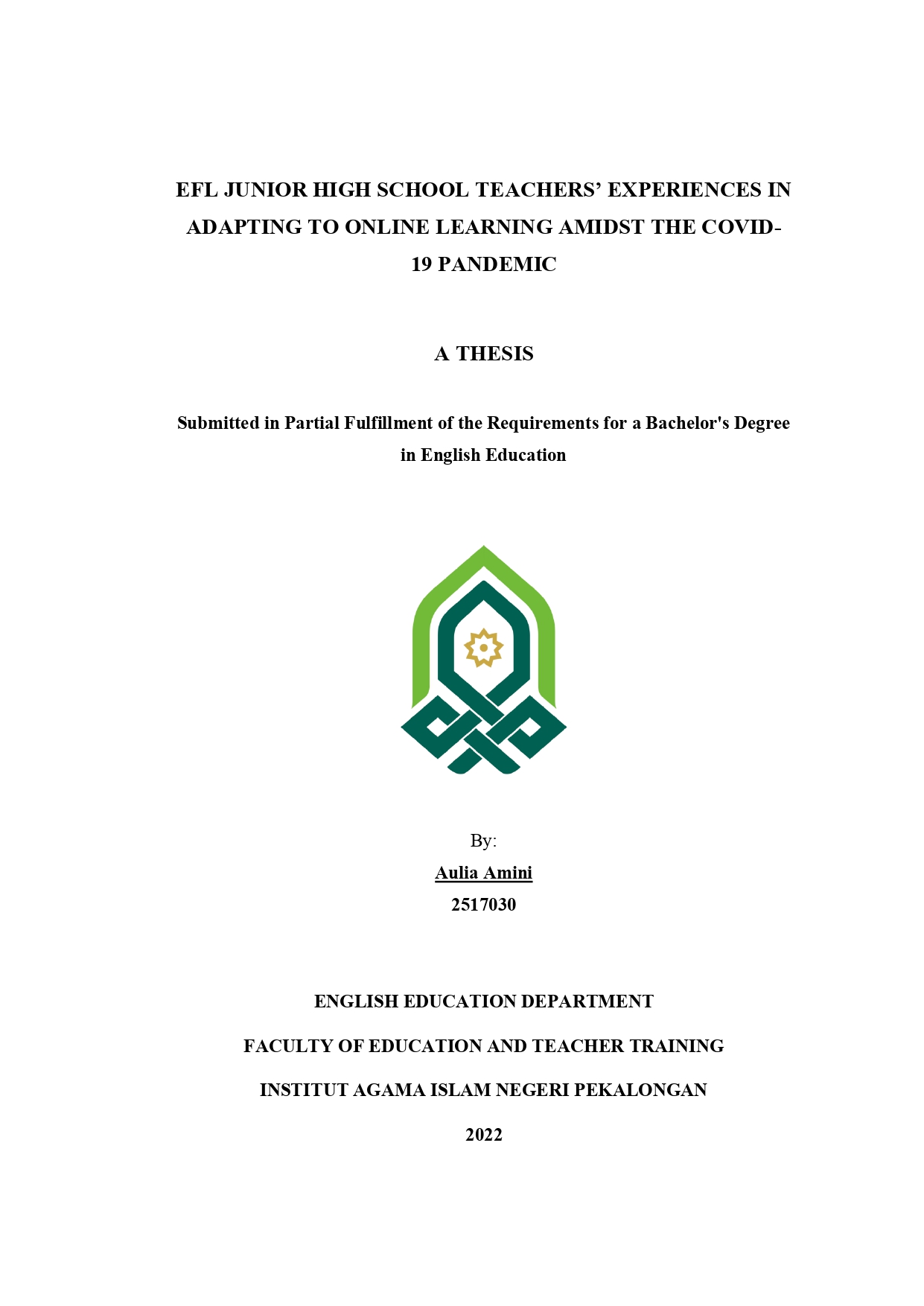
SKRIPSI TADRIS BAHASA INGGRIS
EFL Junior High School Teachers' Experiences in Adapting to Online Learning Amidst The Covid-19 Pandemic
The consequence of the Covid-19 pandemic and the unexpected transition to online learning activities has forced students and teachers to adjust considerably in the learning process. The current study shines a spotlight on EFL Junior High School teachers’ experiences and challenges in online learning due to the Covid-19 pandemic. The essential data were gathered using a semi-structured interview from Indonesian EFL teachers’ viewpoints and were investigated by integrating relevant literature and analyzed using thematic analysis. The result revealed three primary themes in teachers’ experience during the online learning process, namely: (1) Perspectives of teachers as a facilitator in online learning, (2) Challenges and issues raised during online learning, and (3) Suggestions to cope with the problem. Developing teachers' competencies and qualities, providing adequate digital platforms, and designing interactive learning approaches need to be done to confound the hindrances of online learning in the future. This research provides valuable contributions and suggestions for English teachers to improve online learning, especially during the Covid-19 crisis.
Keywords: EFL teacher, experience, teacher challenges, English online learning, covid-19
REFERENCES
Agostinelli, M. D. (2019). From distance education to online education: a review of the literature. Graduate Student Theses, Dissertations, & Professional Papers. 11335. https://scholarworks.umt.edu/etd/11335
Ali, W., & Kaur, M. (2020). Mediating educational challenges amidst COVID-19 pandemic. Asia Pacific Institute of Advanced Research (APJCECT), 6(2), 40-57.
Anderson T (2016) Theories for learning with emerging technologies. Emerging technologies in distance education 7(1),7–23
Anderson, M., & Perrin, A. (2018). Nearly one-in-five teens can’t always finish their homework because of the digital divide. Pew Research Center. https://www.pewresearch.org/fact-tank/2018/10/26/nearly-one-in-fve-teens-cant-always-fnish-their-homework-because-of-the-digit al-divide/
Arora, A. K., & Srinivansen, R. (2020). Impact of pandemic COVID-19 on the teaching-learning process: A study of higher education teachers. Parabandhan: Indian Journal of Management, 13(4), 43–56. https://doi.org/10.17010/ pijom/2020/v13i4/151825
Bao W. (2020). COVID-19 and online teaching in higher education: A case study of Peking University. Hum Behav & Emerg Tech, 2(1),13–115. https://doi.org/10.1002/hbe2.191
Basilaia, G., & Kvavadze, D. (2020). Transition to online education in schools during a SARS-CoV-2 coronavirus (COVID-19) pandemic in Georgia. Pedagogical Research, 5(4), 1–9. https://doi.org/10. 29333/pr/7937
Baticulon, Ronnie E., Nicole R. I. Alberto, Maria B. C., Baron, & Reyes, J. C. B. (2020). “Barriers to Online Learning in the Time of COVID-19: A National Survey of Medical Students in the Philippines. MedRxiv 1–19. DOI: 10.1101/2020.07.16.20155747.
Bhattarai, P. (2020). English Language Teachers’ Experience on Online Teaching amidst COVID-19. Linguistic Forum-A Journal of Linguistics, 2(3), 23–29. https://doi.org/10.53057/linfo/2020.2.3.4
Ketersediaan
| 23SK2325040.00 | SK TI 23.040 AUL e | My Library (Lantai 3. Local Content) | Tersedia |
Informasi Detail
- Judul Seri
-
-
- No. Panggil
-
SK TI 23.040 AUL e
- Penerbit
- Pekalongan : Jurusan S-1 Tadris Bahasa Inggris FTIK UIN K.H. Abdurrahman Wahid Pekalongan., 2022
- Deskripsi Fisik
-
xiii, 59 hlm., 30 cm; Bibliografi: 60-68
- Bahasa
-
Inggris
- ISBN/ISSN
-
-
- Klasifikasi
-
371. 35
- Tipe Isi
-
-
- Tipe Media
-
-
- Tipe Pembawa
-
-
- Edisi
-
-
- Subjek
- Info Detail Spesifik
-
-
- Pernyataan Tanggungjawab
-
Aulia Amini (2517030)
Versi lain/terkait
Tidak tersedia versi lain
Lampiran Berkas
Komentar
Anda harus login sebelum memberikan komentar
 Karya Umum
Karya Umum  Filsafat
Filsafat  Agama
Agama  Ilmu-ilmu Sosial
Ilmu-ilmu Sosial  Bahasa
Bahasa  Ilmu-ilmu Murni
Ilmu-ilmu Murni  Ilmu-ilmu Terapan
Ilmu-ilmu Terapan  Kesenian, Hiburan, dan Olahraga
Kesenian, Hiburan, dan Olahraga  Kesusastraan
Kesusastraan  Geografi dan Sejarah
Geografi dan Sejarah